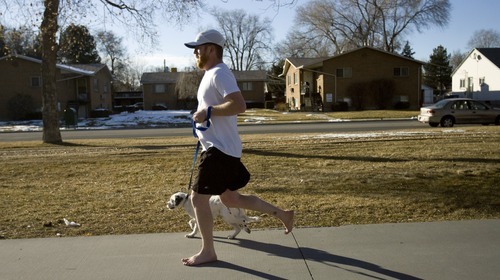This is an archived article that was published on sltrib.com in 2012, and information in the article may be outdated. It is provided only for personal research purposes and may not be reprinted.
This was a great winter to bring a business prospect to northern Utah. It also was a great season for a healthy pregnancy, for dodging asthma attacks, for avoiding a stroke — in short, for breathing clean winter air.
That's because polluted air never settled in for days and weeks at a time the way it usually does during the inversion season. Warm temperatures and an absence of snow helped keep pollution from building.
Bryce Bird, director of the Utah Division of Air Quality, noted that there were just five times from October through February when any of the 12 monitors logged high levels of particulate pollution.
"Yes, we had a great year," he said, noting that the climate had more to do with the easy breathing than preventative action did.
The U.S. Environmental Protection Agency has determined that PM 2.5 pollution in concentrations 35 micrograms per cubic meter of air or more is unhealthy. The agency has directed Utah, Salt Lake, Davis, Weber Cache counties, plus portions of Tooele and Box Elder counties to come up with plans to control the pollutant because of a history of inversion periods when the air in these areas was foul and unhealthy.
Bird said one good year does not mean it's time to drop government, business and the public efforts to address air-quality problems.
"This winter should remind people this is how good the air can and should be," he said.
Brian Moench, co-founder of Utah Physicians for a Healthy Environment, agreed that good fortune was the biggest factor.
"And we're all the beneficiaries," he said.
He pointed to the growing list of studies that link dirty air to a long list of harmful and even deadly impacts. More PM 2.5 pollution means, among other things, more heart attacks and strokes, faster cognitive decline, increased hospitalizations because of asthma, unhealthier pregnancies and births, poorer outcomes for couples using in vitro fertilization, fewer complications from diabetes, less juvenile arthritis and breast cancer, and fewer premature deaths.
"There are tremendous health benefits," Moench said, "from cleaning up the air."
Ryan Evans, of the Salt Lake Chamber of Commerce, said the low pollution readings this winter are "a huge sigh of relief" for businesses already in the state and for those trying to recruit more economic development.
The chamber is planning next week to unveil its Clean Air Champions program, aimed at engaging the business community on clean-air issues.
"We have our foot on the gas," he said, "and we're going to keep going. This is a long-term program for us."
Twitter: judyfutah



